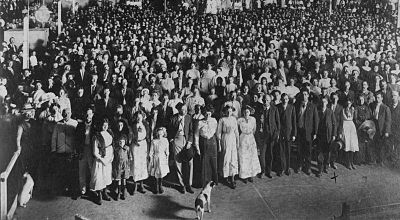What is the Next Move of God?
One of the biggest dangers Christians face is thinking inside the proverbial religious box. When we talk about “a great move of God” or “revival” we often contextualize it inside a church building. We get visions of people coming to a facility, worshipping God, hearing a fiery evangelist and flooding the altar for prayer.
Even when we take it “to the streets” it still looks a lot like it does inside the church walls. We speak to people using the same language and pray for them just like we do in church, except that the setting has changed.
We preach with Bibles in our hands or set up stages and play the same music we sing on Sundays. We bring church outside the walls of the auditorium but continue ministering in the same old wineskin we’ve used for decades.
If people are not interested in experiencing it inside the church, then why do we think they want to experience it outside the church? Trying to invoke a move of God this way does not recognize ways that God is already moving in people’s lives apart from the traditional activities of the church.
The New Testament church was different. They had an advantage. The fact that they had no buildings or traditions to protect provided them with a wide-open field of thinking. They had no box. For them, envisioning a move of God or describing what revival looks like wasn’t hindered by preconceived ideas. They were able to see the world in a whole new light, one that exposed the closed-mindedness of the Jewish ideas regarding the work of God among the gentile people.
Like those first century Jewish leaders, Christians today can become extremely closed-minded about God’s activity outside our circles. After a span of 2,000 years, maybe we’ve developed the tendency to believe that God thinks like us, acts like us, votes like us, talks like us and enjoys hanging with us.
This was especially true with Paul until Jesus confronted him on the road to Damascus. That one conversation with Jesus obliterated every preconceived idea and paradigm Paul ever had. Nothing was the same for him after that. Everything in the world had changed for him. He had to reconstruct his entire religious, social, cultural and political worldviews.
Mental deconstruction is usually harder than construction. This is why it was about 14 years between Paul’s conversion and the time he and Barnabas were sent out in Acts 13. He needed time to rethink everything.
After completing his first missionary journey—one that saw more gentiles coming to Christ than Jews—Paul chose Silas and went out again (see Acts 16). With some experience under his belt, Paul and his entourage traversed the length of Asia Minor until they were at Troas on the Aegean Sea. From there, they crossed over to Macedonia and started the Grecian campaign.
At Mars Hill, Paul presented a remarkable and brilliant perspective on the move of God outside the walls of the church. What he said would stun anyone who believes that God moves only in certain ways, with certain people and in certain places (you know—people like us!).
Paul said that God had been revealing Himself in various ways with various cultures from the beginning; that God loves all human beings and is active in bringing them into a relationship with Him through various means (see Acts 17:22-31).
While walking the streets of Athens, Paul saw many idols that the Greeks worshipped. Among them was a statue dedicated to “The Unknown God.” The Athenians knew there was a God out there somewhere who couldn’t be named in their pantheon yet deserved to be worshipped. Regarding this God and their worship of Him, Paul said, “Therefore, the One whom you worship without knowing, Him I proclaim to you” (Acts 17:23).
Did you get that?
Paul affirms that the Athenians had been ignorantly worshipping the God of the Jews—Yahweh. They simply had not known His name and did not have the full revelation of His ways and desires for mankind.
It didn’t mean they were in covenant with God.
It didn’t mean they were born again.
But it did testify to the fact that God was working in their hearts, having placed in them a desire to know Him. Somewhere during their history, the Greeks had come to believe that there was a God whose name they didn’t know but who deserved their worship.
God may be moving outside the walls of the church more than we can imagine!
Paul was able to discern God’s work in that culture and align his message with that move of God and speak to the Athenians in practical, relevant ways.
After assuring them that God is bigger than buildings and even bigger than our imaginations or abilities to worship Him (Acts 17:24-25), he says God “has determined [nations’] pre-appointed times and the boundaries of their dwellings” (Acts 17:26). That is, it is God who is responsible for the rise and fall of nations, and He establishes their boundaries.
Then Paul adds something else. He says God works among the people of the earth for one reason: “That they should seek the Lord, in the hope that they might grope for Him and find Him, though He is not far from each one of us” (Acts 17:27).
Paul is admitting that God has been working all along the course of human history in the nations of the earth. While He was preparing Israel to be a blessing to the other people of the earth, He was also preparing the nations to receive this good news and accept His Word. While Israel was being groomed to be a blessing, God was not far from the other people groups of the earth, grooming them as well to join this community He was blessing.
Human history hasn’t stopped moving. So why would we think God has stopped moving? To this day, we must affirm that God is working in our neighborhoods, cities and nations just as much as He is working in the church. If we limit our definition of a “move of God” or a “revival” only to religious services in a building somewhere, then we will miss what God is really doing on the earth.
This is why it is my belief that we cannot define the next move of God by the last move of God. It is not wise for us, as Christians, to try to recreate past revivals and moves of God. We must have an open mind and look outside our religious box to see where God is going.
It may surprise many believers to know that God is speaking to people outside the church. Some people may even believe it is impossible for God to give revelation to a “heathen.” But Paul didn’t. In Acts 17:28 he affirmed that Greek poets had spoken the truth about God! He said: “For in Him we live and move and have our being, as also some of your own poets have said, ‘For we are also His offspring.’”
Not only were the people of Athens worshipping the God of the Bible but their poets also were actually receiving revelation about Him and His desire to have a relationship with all people. This is quite an amazing observation and admission for a devout Jew who formerly believed the rabbinical saying that gentiles were created to “fuel the fires of hell.”
Jesus said in John 16:8 that the Holy Spirit will come to “convince the world of sin, righteousness and judgment to come” (emphasis added). We should not think it strange that when the Holy Spirit was poured out on “all flesh” (Acts 2:16-21) people outside the church would receive bits and pieces of revelation that could ultimately lead them to Christ.
Paul also said in Romans 1:19 that “what may be known of God is manifest in them, for God has shown it to them” (emphasis added). This verse asserts that God is working inside the hearts of people all over the world, revealing truth to them.
Besides speaking internally to them, God also speaks to them eternally through nature, as Paul acknowledges: “For since the creation of the world His invisible attributes are clearly seen, being understood by the things that are made, even His eternal power and Godhead, so that they are without excuse” (Rom. 1:20).
I have to admit—most of the time I’m looking outside the walls of the church these days to find the move of God.
If we can discern God in the culture the way Paul did, then we will be able to see how to bring in the harvest. The harvest tells you when it’s time to reap; you reap on the harvest’s terms, not your own!
What I see God doing in the culture is exciting. More and more people are looking for what’s real. They are nauseated by what’s fake and phony. Slick productions are being replaced by reality TV. People value participation. They would rather upload their own video on You Tube than watch one on television.
People want to connect with each other. The global community is getting smaller as combinations of technology drive everything from the global economy to the uprisings of the so-called Arab Spring.
Can you see it?
Like Paul, do you see God in all this?
Nicki Pfeifer is co-founder with her husband, Mark, of Open Door Ministries in Chillicothe, Ohio (opendoorohio.com), where they serve as senior pastors. They are also the founders of Mark and Nicki Pfiefer Ministries (markandnicki.com), and Nicki is the founder of the Fire School of Prophetic Training, which has locations throughout the U.S., Asia and Africa. A recognized prophetic voice, Nicki is in demand as a speaker at conferences in the United States and other countries.







































